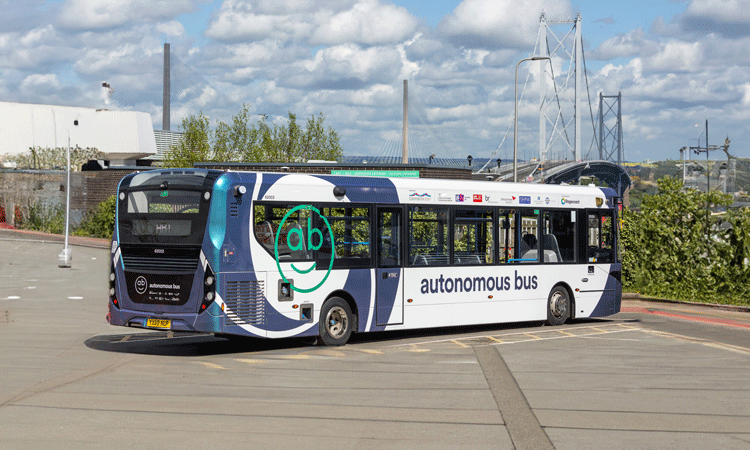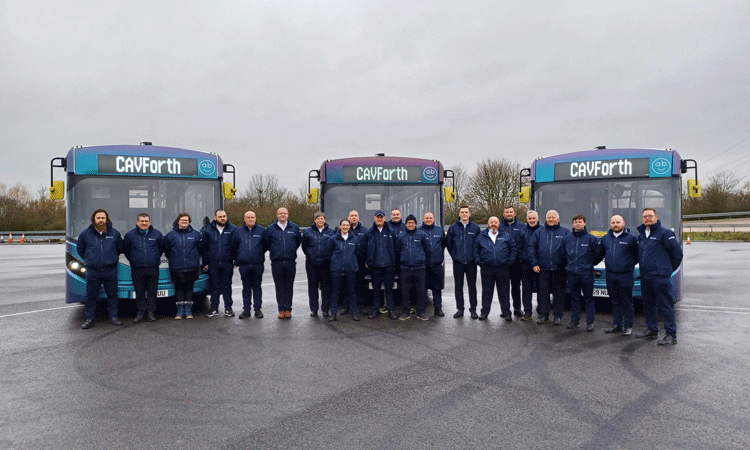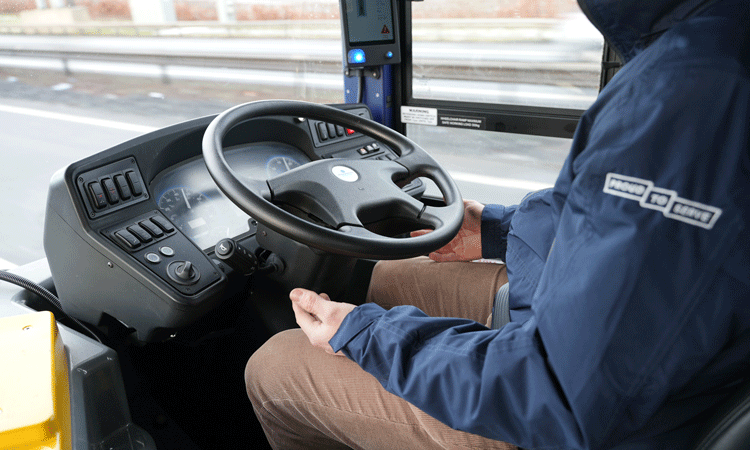Stagecoach’s ground‑breaking autonomous bus project: Pioneering a new era in public transport
- Like
- Digg
- Del
- Tumblr
- VKontakte
- Buffer
- Love This
- Odnoklassniki
- Meneame
- Blogger
- Amazon
- Yahoo Mail
- Gmail
- AOL
- Newsvine
- HackerNews
- Evernote
- MySpace
- Mail.ru
- Viadeo
- Line
- Comments
- Yummly
- SMS
- Viber
- Telegram
- Subscribe
- Skype
- Facebook Messenger
- Kakao
- LiveJournal
- Yammer
- Edgar
- Fintel
- Mix
- Instapaper
- Copy Link
Posted: 12 March 2024 | Steven Russell - Stagecoach | No comments yet
Stagecoach and its partners are proud to operate the UK’s first registered commercial bus service using a fleet of autonomous vehicles. The research and service design work that has gone into making AB1 a reality in East Scotland has been trailblazing. It has allowed the operator to demonstrate a real-world use case for self-driving technology. Stagecoach is doing it on real roads, carrying thousands of people, and it is helping to build public trust in this emerging industry by operating a safe, passenger-centric bus service… that drives itself. For Intelligent Transport, Steven Russell, Innovation Manager at Stagecoach Bus, shares a glimpse into the future of transportation, where autonomous buses seamlessly coexist with traditional modes of transport.


In the heart of East Scotland, a quiet revolution in public transportation is underway. Stagecoach, the UK’s largest bus operator, with a legacy of over 40 years, is once again at the forefront of innovation. Described as the ‘original transport disruptors’, Stagecoach has embarked on a journey to explore the emerging potential of self-driving technology and what it might mean for its passengers and its business.
CAVForth set the audacious goal of being the UK’s first ‘live’ autonomous bus service”
The seeds of this endeavour were sown in 2017, when Stagecoach partnered with renowned bus builders Alexander Dennis Ltd and autonomous system provider Fusion Processing Ltd. What began as a private experiment involving automating a vehicle to navigate a depot, re-fuel, undergo a bus wash and park itself for the night, soon evolved into a visionary project dubbed ‘CAVForth.’ This ambitious proposal was submitted to a national UK innovation competition and received grant funding from the Centre for Connected & Autonomous Vehicles (CCAV).
CCAV sought projects that aimed to bring autonomous technology to the real world, and CAVForth set the audacious goal of being the UK’s first ‘live’ autonomous bus service. By ‘live’, we mean a registered, timetabled service operating on real roads alongside regular traffic, accessible to anyone who sees enough value in travel to purchase a ticket.
The road to AB1
Since commencing in 2019, the CAVForth project has seen the collaboration of the three pioneering private companies – Stagecoach, ADL and Fusion – joined by the invaluable contribution of the roads authority, Transport Scotland; transport researchers from Edinburgh Napier University; and safety validation experts from Bristol Robotics Lab, supported by the University for the West of England.
Their collective efforts have culminated in a remarkable achievement – AB1.
AB1, referred to as Autonomous Bus Number 1, is the UK’s first full-size autonomous bus service, which has been in operation since May 2023. Cruising a 14‑mile route at speeds of up to 50mph and stopping at three key locations, AB1 crosses the iconic Forth Road Bridge, giving breathtaking views of the Forth (Railway) Bridge, a UNESCO World Heritage Site. The route consists of motorways, A-roads and a stretch of bus lane, with transport hubs at either end. It navigates complex junctions like roundabouts, traffic lights and weaving merges, all alongside other regular motorists. Most importantly, though, it is a new transport link supporting commuters travelling from Fife to the West of Edinburgh.
This journey is powered by a fleet of four retrofitted Alexander Dennis Enviro200AV buses. These are full-size, 36-seat, single-deck buses; the model is the UK’s most popular city bus. Fusion Processing’s patented CAVStar® system of sensors and control computers drives them. The Society of Automotive Engineers has agreed on a global standard to define autonomous capability. These buses can operate at SAE Autonomous Level 4, as key subsystems such as sensors, processing, steering, braking and powertrain control have been duplicated, offering full critical system ‘redundancy’, which, in turn, brings a higher level of safety.


Credit: Stagecoach
Having carried members of the public since January 2023 to gain feedback and test the offer, the Scottish Minister for Transport heralded the commencement of the full-service launch in May 2023, kicking off the live timetable, which runs Monday to Sunday, delivering a 30-minute service and the capacity for up to 10,000 passenger journeys per week.
Putting passengers at the heart of our decisions
AB1 has provided thousands of passengers from across the UK and beyond with their first taste of self‑driving public transport, covering over 65,000km in autonomous mode”
In the four months since its launch, AB1 has provided thousands of passengers from across the UK and beyond with their first taste of self‑driving public transport, covering over 65,000km in autonomous mode. What’s most striking is the overwhelmingly positive passenger feedback. Many are taken aback by how ‘normal’ travelling feels and how seamlessly they have moved to a commute that relies on self-driving technology.
Stagecoach uses an on-board system to monitor how smoothly the vehicles are driven, and the latest data shows that the fleet of autonomous buses now delivers the same quality of driving as manual‑driven buses on a comparable route. Gentle driving brings a smoother ride for the passengers, can improve fuel efficiency and reduces vehicle wear and nanoparticle emissions.
Throughout its development, Stagecoach had conducted extensive consultations with over 500 members of the public to gauge their expectations of an autonomous bus service. These insights have strongly influenced the passenger-centric approach employed, including the presence of a staff member in ‘the captain’ role on-board. This approach underlines Stagecoach’s belief that public bus services of this nature should continue to be staffed to ensure safety, inclusivity and accessibility for all.
The insights gleaned from this research have also played a crucial role in designing the surrounding experience and interactions that passengers and the public will have with the service. For example, the bus’s livery, which seeks to be eye‑catching without being intimidating; as well as the information and marketing campaigns associated with the service, which aim to build trust, manage expectations and elucidate the potential benefits of this ground-breaking technology. AB1 has also been seamlessly integrated into Stagecoach’s existing touchpoints, making it accessible to passengers using their preferred journey‑planning and customer support methods.


Credit: Stagecoach
Prioritising safety
Stagecoach and its partners have meticulously constructed a comprehensive safety case, ensuring that the trial is safe for operation on public roads”
Safety has been paramount in the development of this project. Stagecoach and its partners have meticulously constructed a comprehensive safety case, ensuring that the trial is safe for operation on public roads. This includes aspects such as safety driver recruitment, selection and training; vehicle maintenance; on-board carriage conditions; servicing; and incident response protocols. For the length of the trial, a safety driver will always be in the cab, able to monitor and mentor the technology, offering suggestions on where it should drive differently and be there to intervene, if necessary. The vehicles currently manage 90% of the route in autonomous mode, with the final 10% to be released into autonomous in the coming months, subject to testing.
Fostering open innovation and global engagement
In its commitment to open innovation and transparency, Stagecoach continues to share information about the project and its insights across the UK. This includes a detailed project brochure that addresses the ‘top 10’ technical questions in-depth. The company frequently participates in events and host visitors, ranging from local schools to industry groups, with numerous international delegations making the pilgrimage to East Scotland to experience AB1 firsthand.
The project’s success has garnered follow-up funding, securing its continued operation until 2025. A new challenge on the horizon is to extend the route north into Dunfermline City Centre, adding urban driving, additional intermediary stops and a working city bus station to the route, which would mark another significant milestone in pushing the boundaries of autonomous technology, driving it to be more analogous to traditional bus routes. The follow-on project will also see Fusion’s autonomous drive system integrated into the all‑new Alexander Dennis Enviro100AEV electric bus from the design stage.
AB1 has not only received praise from local stakeholders, but has also been hailed by national media as the world’s most ambitious autonomous bus trial, setting a precedent for the future of public transportation.


Related topics
Connected & Autonomous Vehicles, Passenger Experience, Public Transport, Sustainable Urban Transport, Vehicle & Passenger Safety
Issue
Issue 4 2023
Related modes
Autonomous vehicles, Bus & Coach
Related countries
Scotland, United Kingdom
Related organisations
Stagecoach
Related people
Steven Russell








